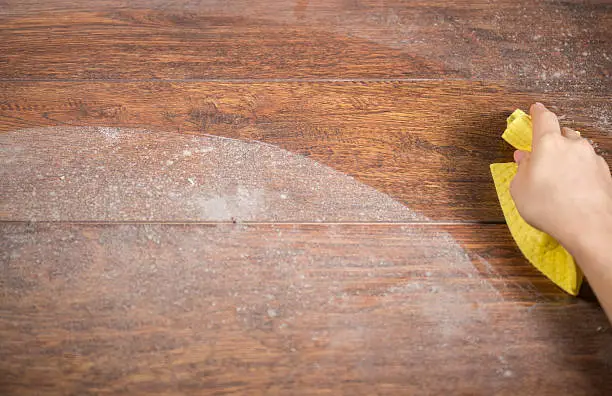Engineered hardwood floors are a coveted choice among homeowners, seamlessly merging elegance with resilience. Their enduring appeal lies in their ability to effortlessly elevate any space while standing up to the rigors of daily life. Yet, preserving their inherent allure and durability necessitates meticulous care and maintenance. In this extensive guide, we journeyed to unravel the artistry behind effectively cleaning engineered hardwood floors.
From time-tested techniques to innovative approaches, we equip you with the knowledge and expertise to uphold the pristine condition of your floors with finesse. Join us as we navigate the nuances of caring for engineered hardwood floors, empowering you to cultivate a living environment that exudes sophistication and longevity.
Understanding Engineered Hardwood Floors:
Before diving into the cleaning process, let’s briefly understand what engineered hardwood floors are. Unlike solid hardwood, engineered hardwood comprises multiple layers of wood veneer glued together, topped with a layer of hardwood veneer. This construction makes engineered hardwood more resistant to moisture and temperature fluctuations but still requires regular maintenance to preserve its appearance.
1. How to Clean Engineered Hardwood Floors:
Cleaning engineered hardwood floors involves a delicate balance of removing dirt and grime without causing damage to the surface. Here’s a step-by-step guide:
- Sweep or Vacuum: Remove loose dirt and debris using a soft-bristled broom or a vacuum cleaner with a hardwood floor attachment. Avoid using a vacuum with a beater bar, as it can scratch the floor’s surface.
- Damp Mop: Lightly dampen a microfiber mop or cloth with water or a specially formulated hardwood floor cleaner.
Avoid excessive water, which can seep into the wood and cause warping or swelling. Always follow the manufacturer’s recommendations for cleaning products. - Wipe Spills Immediately: Accidents happen, but it’s essential to wipe up spills promptly to prevent them from seeping into the wood and causing damage. Use a clean, dry cloth to blot up spills as soon as they occur.
- Avoid Harsh Chemicals: When cleaning engineered hardwood floors, avoid harsh chemicals such as bleach, ammonia, or vinegar, as they can strip the finish and damage the wood. Opt for pH-neutral cleaners specifically designed for hardwood floors.
2. Cleaning Engineered Hardwood Floors:
Regular maintenance is critical to keeping engineered hardwood floors looking their best. Here are some additional tips for maintaining cleanliness:
- Use Furniture Pads: Place felt pads or coasters under furniture legs to prevent scratches and dents from occurring when moving furniture.
- Limit Sun Exposure: Excessive sunlight can discolor and fade engineered hardwood floors. Use curtains or blinds to protect floors from direct sunlight, especially in areas with large windows.
- Rotate Rugs and Mats: To prevent uneven wear patterns, periodically rotate rugs and mats placed on engineered hardwood floors. This helps distribute foot traffic and minimizes the risk of permanent indentations.
- Regular Inspections: Inspect your engineered hardwood floors regularly for signs of wear, scratches, or damage. Addressing issues promptly can prevent them from worsening over time.
3. Clean Engineered Hardwood Floors:
Deep-engineered hardwood floors should be cleaned periodically to remove stubborn dirt and grime. Here’s how to tackle deep cleaning:
- Steam Cleaning: Steam cleaning can be an effective way to deep clean engineered hardwood floors, but it’s essential to use caution. Only use a steam cleaner specifically designed for hardwood floors and follow the manufacturer’s instructions carefully.
- Recoating: If the finish on your engineered hardwood floors shows signs of wear, consider recoating them to restore their appearance. Consult a professional flooring contractor for recommendations on the best products and techniques for recoating.
- Professional Cleaning: For heavily soiled or stubborn stains, consider hiring a professional cleaning service specializing in hardwood floors. They have the expertise and equipment to clean engineered hardwood floors safely and effectively without causing damage.
4. Best Way to Clean Engineered Hardwood Floors:
The best way to clean engineered hardwood floors is to follow a regular maintenance routine, regularly sweeping or vacuuming, damp mopping as needed, and promptly addressing spills. Avoid harsh chemicals and excessive water, and consider deep cleaning periodically to keep floors looking their best.
Conclusion:
Maintaining the cleanliness and longevity of engineered hardwood floors can be a manageable task. Armed with the appropriate techniques and tools, preserving the aesthetic appeal and durability of your flooring becomes a straightforward endeavor. The insights in this guide offer a roadmap to effective cleaning practices, ensuring that your engineered hardwood floors retain their allure for years to come.
By adhering to these recommendations, you can approach the task confidently and precisely, achieving results that rival those of professionals. Embracing these strategies enhances the immediate visual appeal of your floors and secures their resilience for future generations to enjoy. With diligence and care, your engineered hardwood floors can be a testament to timeless elegance, enriching your living space for years.

